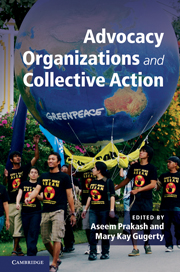Book contents
- Frontmatter
- Contents
- Figures and tables
- Contributors
- Preface
- Acknowledgments
- 1 Advocacy organizations and collective action
- Part 1 The institutional environment and advocacy organizations
- 2 The price of advocacy
- 3 Acting in good faith
- 4 Institutional environment and the organization of advocacy NGOs in the OECD
- Part 2 Advocacy tactics and strategies
- Part 3 International advocacy and market structures
- Part 4 Toward a new research program
- Index
- References
3 - Acting in good faith
an economic approach to religious organizations as advocacy groups
Published online by Cambridge University Press: 05 June 2012
- Frontmatter
- Contents
- Figures and tables
- Contributors
- Preface
- Acknowledgments
- 1 Advocacy organizations and collective action
- Part 1 The institutional environment and advocacy organizations
- 2 The price of advocacy
- 3 Acting in good faith
- 4 Institutional environment and the organization of advocacy NGOs in the OECD
- Part 2 Advocacy tactics and strategies
- Part 3 International advocacy and market structures
- Part 4 Toward a new research program
- Index
- References
Summary
Advocacy groups are all the rage! Over the past two decades, a new cottage industry has erupted in academia examining the seemingly explosive growth in new social movements, advocacy groups and non-governmental organizations (NGOs) that has occurred in Western industrialized nations and several developing nations as well. Many of these movements and NGOs have crossed international boundaries, feeding the notion that globalization is eroding boundaries between people all around the world. This literature certainly has added to our knowledge of how advocacy groups originate and operate. But curiously missing from these recent studies has been any discussion of what amounts to the world’s most common, oldest, and largest advocacy bodies – religious organizations.
Consider the following question: what is the world’s oldest formal, hierarchical institution that is still in existence today? If you answered the Roman Catholic Church, go to the head of the class. Depending on how one defines the hierarchical origins of the Roman Catholic Church, that institution has been around between 1,700 and 2,000 years. Even with the lower estimate, the Catholic Church has existed far longer than any contemporary state or historical dynasty and has done so even in the most turbulent of times. Further consider that the Catholic Church possesses roughly 1 billion members around the globe, with a presence in nearly every country. What other formal organization can boast of such tremendous size and international scope? One would imagine that social scientists interested in organizational emergence, preservation and collective action would want to know what makes this organization tick. But we should not just stop there. Protestantism, Judaism, Islam, Hinduism, and a variety of other religious traditions have existed for hundreds or thousands of years, often without the benefit of a centralized organization like the Catholic Church.
- Type
- Chapter
- Information
- Advocacy Organizations and Collective Action , pp. 58 - 90Publisher: Cambridge University PressPrint publication year: 2010
References
- 3
- Cited by



